Ethical Principles and Dilemmas in Psychology: A Detailed Analysis
VerifiedAdded on 2022/09/09
|8
|2362
|54
Essay
AI Summary
This essay explores several ethical principles and potential dilemmas within the field of psychology. It begins by addressing the importance of upholding ethical conduct in various professional roles, highlighting the potential for conflicts arising from workplace pressures. The essay then delves into specific ethical principles, including the avoidance of data misuse and misinterpretation, emphasizing the importance of accurate and objective reporting. Confidentiality is another key principle discussed, with a focus on protecting client information and maintaining professional boundaries. The principle of non-maleficence, which involves avoiding harm to clients, is also examined through case studies. Furthermore, the essay addresses the ethical implications of informed consent, particularly in the context of counseling minors. Finally, it touches upon the importance of maintaining integrity and avoiding multiple relationships in psychological practice. The author concludes by emphasizing the need for psychologists to be aware of ethical challenges and to take proactive steps to address them, ultimately striving to be the best professionals they can be.
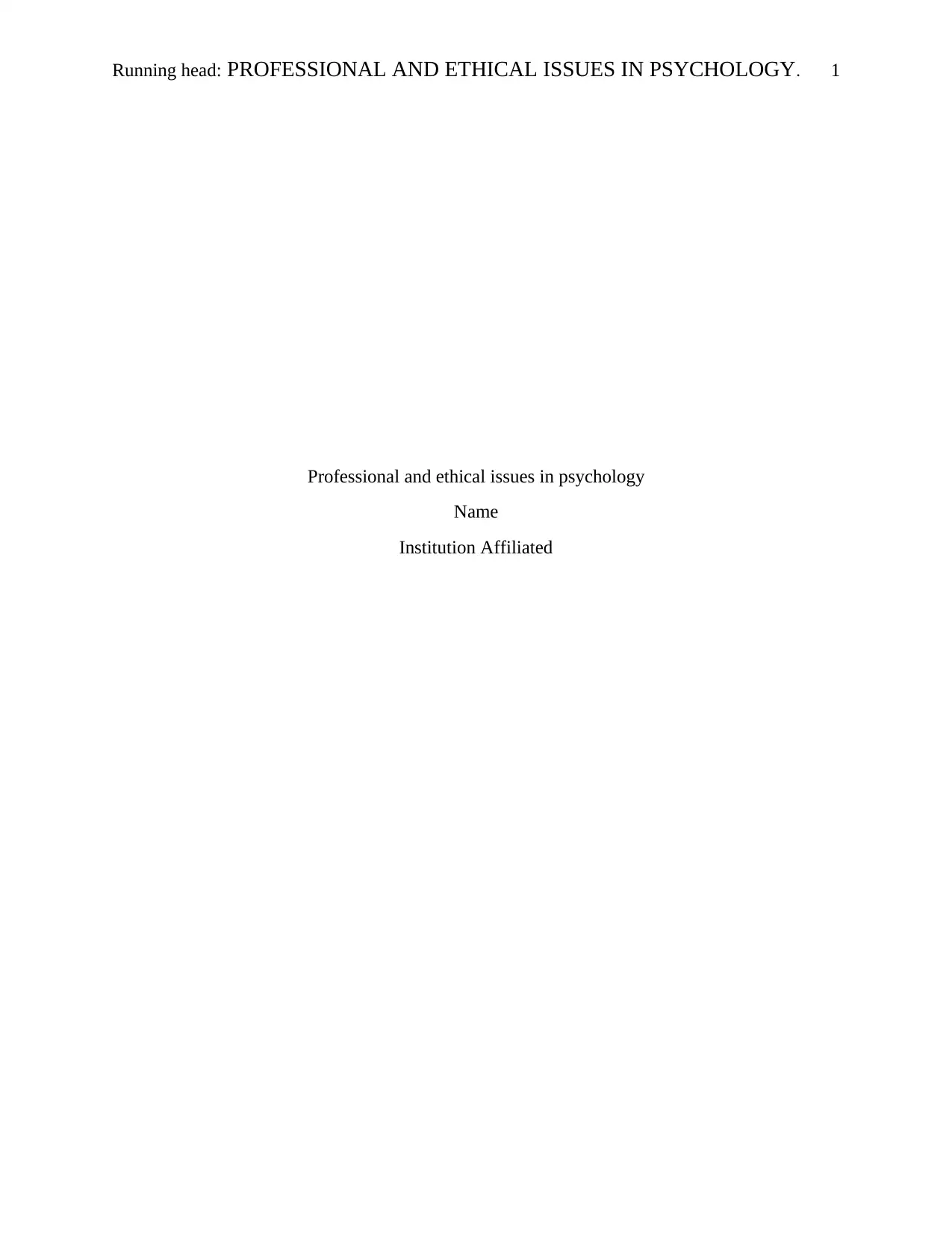
Running head: PROFESSIONAL AND ETHICAL ISSUES IN PSYCHOLOGY. 1
Professional and ethical issues in psychology
Name
Institution Affiliated
Professional and ethical issues in psychology
Name
Institution Affiliated
Paraphrase This Document
Need a fresh take? Get an instant paraphrase of this document with our AI Paraphraser
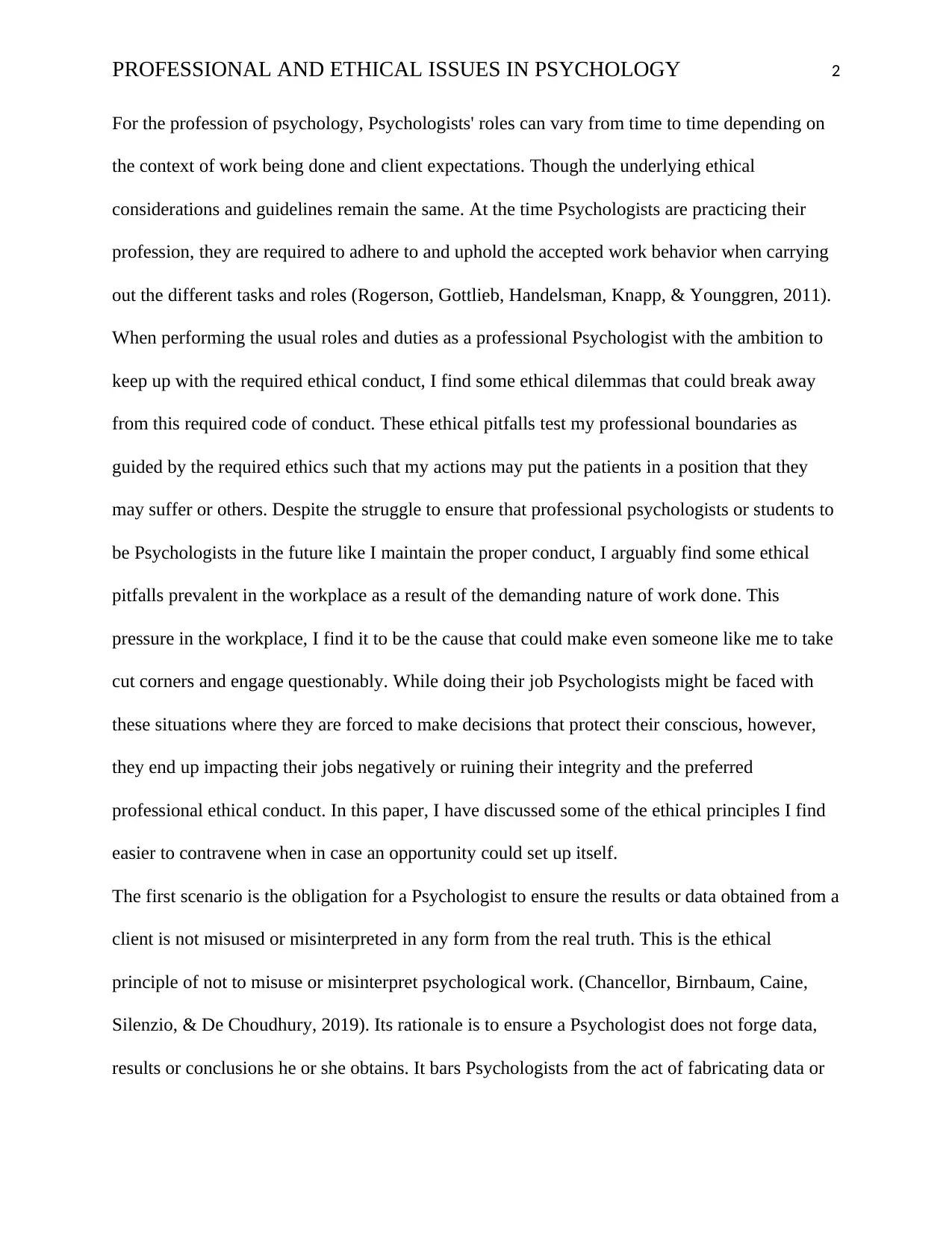
PROFESSIONAL AND ETHICAL ISSUES IN PSYCHOLOGY 2
For the profession of psychology, Psychologists' roles can vary from time to time depending on
the context of work being done and client expectations. Though the underlying ethical
considerations and guidelines remain the same. At the time Psychologists are practicing their
profession, they are required to adhere to and uphold the accepted work behavior when carrying
out the different tasks and roles (Rogerson, Gottlieb, Handelsman, Knapp, & Younggren, 2011).
When performing the usual roles and duties as a professional Psychologist with the ambition to
keep up with the required ethical conduct, I find some ethical dilemmas that could break away
from this required code of conduct. These ethical pitfalls test my professional boundaries as
guided by the required ethics such that my actions may put the patients in a position that they
may suffer or others. Despite the struggle to ensure that professional psychologists or students to
be Psychologists in the future like I maintain the proper conduct, I arguably find some ethical
pitfalls prevalent in the workplace as a result of the demanding nature of work done. This
pressure in the workplace, I find it to be the cause that could make even someone like me to take
cut corners and engage questionably. While doing their job Psychologists might be faced with
these situations where they are forced to make decisions that protect their conscious, however,
they end up impacting their jobs negatively or ruining their integrity and the preferred
professional ethical conduct. In this paper, I have discussed some of the ethical principles I find
easier to contravene when in case an opportunity could set up itself.
The first scenario is the obligation for a Psychologist to ensure the results or data obtained from a
client is not misused or misinterpreted in any form from the real truth. This is the ethical
principle of not to misuse or misinterpret psychological work. (Chancellor, Birnbaum, Caine,
Silenzio, & De Choudhury, 2019). Its rationale is to ensure a Psychologist does not forge data,
results or conclusions he or she obtains. It bars Psychologists from the act of fabricating data or
For the profession of psychology, Psychologists' roles can vary from time to time depending on
the context of work being done and client expectations. Though the underlying ethical
considerations and guidelines remain the same. At the time Psychologists are practicing their
profession, they are required to adhere to and uphold the accepted work behavior when carrying
out the different tasks and roles (Rogerson, Gottlieb, Handelsman, Knapp, & Younggren, 2011).
When performing the usual roles and duties as a professional Psychologist with the ambition to
keep up with the required ethical conduct, I find some ethical dilemmas that could break away
from this required code of conduct. These ethical pitfalls test my professional boundaries as
guided by the required ethics such that my actions may put the patients in a position that they
may suffer or others. Despite the struggle to ensure that professional psychologists or students to
be Psychologists in the future like I maintain the proper conduct, I arguably find some ethical
pitfalls prevalent in the workplace as a result of the demanding nature of work done. This
pressure in the workplace, I find it to be the cause that could make even someone like me to take
cut corners and engage questionably. While doing their job Psychologists might be faced with
these situations where they are forced to make decisions that protect their conscious, however,
they end up impacting their jobs negatively or ruining their integrity and the preferred
professional ethical conduct. In this paper, I have discussed some of the ethical principles I find
easier to contravene when in case an opportunity could set up itself.
The first scenario is the obligation for a Psychologist to ensure the results or data obtained from a
client is not misused or misinterpreted in any form from the real truth. This is the ethical
principle of not to misuse or misinterpret psychological work. (Chancellor, Birnbaum, Caine,
Silenzio, & De Choudhury, 2019). Its rationale is to ensure a Psychologist does not forge data,
results or conclusions he or she obtains. It bars Psychologists from the act of fabricating data or
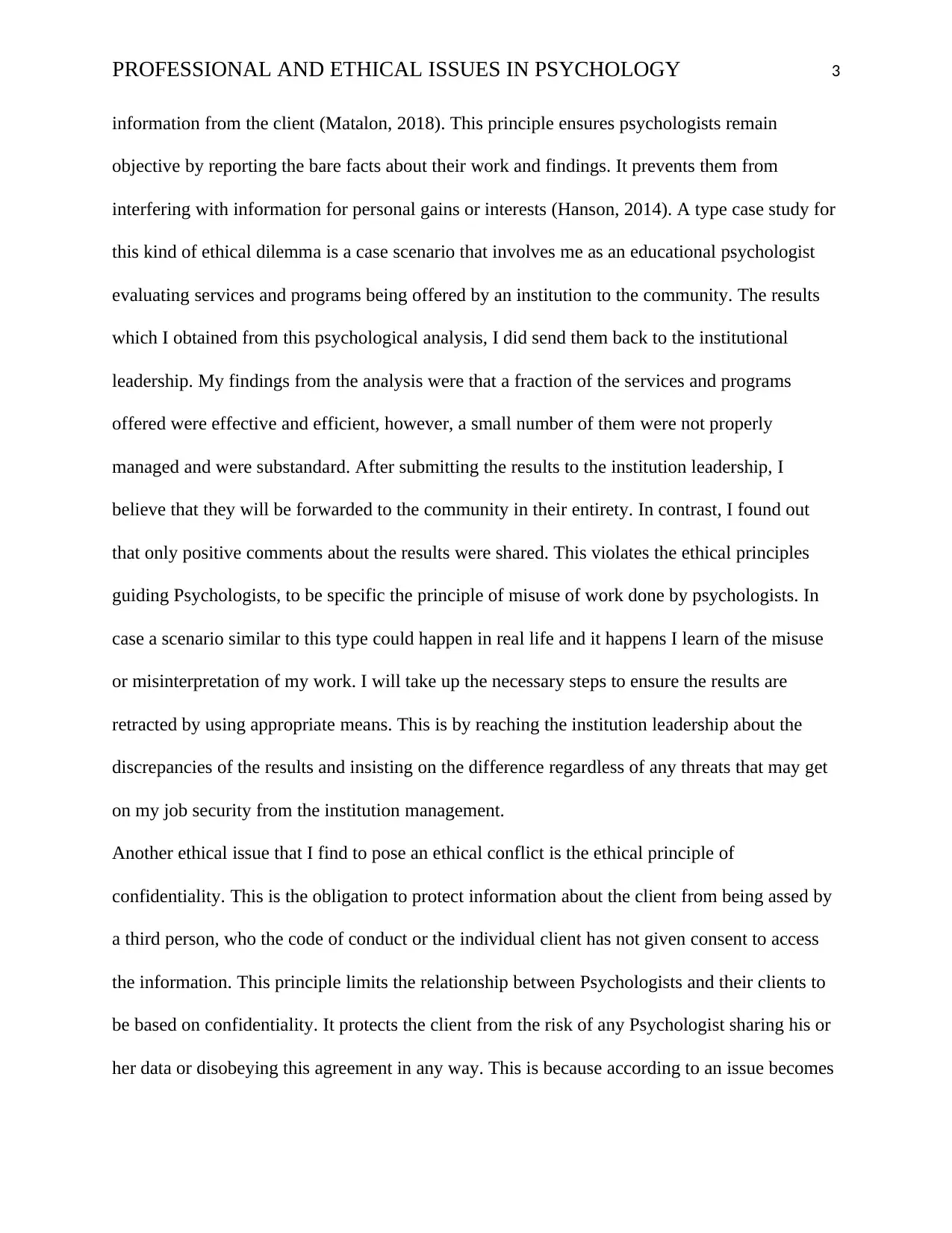
PROFESSIONAL AND ETHICAL ISSUES IN PSYCHOLOGY 3
information from the client (Matalon, 2018). This principle ensures psychologists remain
objective by reporting the bare facts about their work and findings. It prevents them from
interfering with information for personal gains or interests (Hanson, 2014). A type case study for
this kind of ethical dilemma is a case scenario that involves me as an educational psychologist
evaluating services and programs being offered by an institution to the community. The results
which I obtained from this psychological analysis, I did send them back to the institutional
leadership. My findings from the analysis were that a fraction of the services and programs
offered were effective and efficient, however, a small number of them were not properly
managed and were substandard. After submitting the results to the institution leadership, I
believe that they will be forwarded to the community in their entirety. In contrast, I found out
that only positive comments about the results were shared. This violates the ethical principles
guiding Psychologists, to be specific the principle of misuse of work done by psychologists. In
case a scenario similar to this type could happen in real life and it happens I learn of the misuse
or misinterpretation of my work. I will take up the necessary steps to ensure the results are
retracted by using appropriate means. This is by reaching the institution leadership about the
discrepancies of the results and insisting on the difference regardless of any threats that may get
on my job security from the institution management.
Another ethical issue that I find to pose an ethical conflict is the ethical principle of
confidentiality. This is the obligation to protect information about the client from being assed by
a third person, who the code of conduct or the individual client has not given consent to access
the information. This principle limits the relationship between Psychologists and their clients to
be based on confidentiality. It protects the client from the risk of any Psychologist sharing his or
her data or disobeying this agreement in any way. This is because according to an issue becomes
information from the client (Matalon, 2018). This principle ensures psychologists remain
objective by reporting the bare facts about their work and findings. It prevents them from
interfering with information for personal gains or interests (Hanson, 2014). A type case study for
this kind of ethical dilemma is a case scenario that involves me as an educational psychologist
evaluating services and programs being offered by an institution to the community. The results
which I obtained from this psychological analysis, I did send them back to the institutional
leadership. My findings from the analysis were that a fraction of the services and programs
offered were effective and efficient, however, a small number of them were not properly
managed and were substandard. After submitting the results to the institution leadership, I
believe that they will be forwarded to the community in their entirety. In contrast, I found out
that only positive comments about the results were shared. This violates the ethical principles
guiding Psychologists, to be specific the principle of misuse of work done by psychologists. In
case a scenario similar to this type could happen in real life and it happens I learn of the misuse
or misinterpretation of my work. I will take up the necessary steps to ensure the results are
retracted by using appropriate means. This is by reaching the institution leadership about the
discrepancies of the results and insisting on the difference regardless of any threats that may get
on my job security from the institution management.
Another ethical issue that I find to pose an ethical conflict is the ethical principle of
confidentiality. This is the obligation to protect information about the client from being assed by
a third person, who the code of conduct or the individual client has not given consent to access
the information. This principle limits the relationship between Psychologists and their clients to
be based on confidentiality. It protects the client from the risk of any Psychologist sharing his or
her data or disobeying this agreement in any way. This is because according to an issue becomes
⊘ This is a preview!⊘
Do you want full access?
Subscribe today to unlock all pages.

Trusted by 1+ million students worldwide
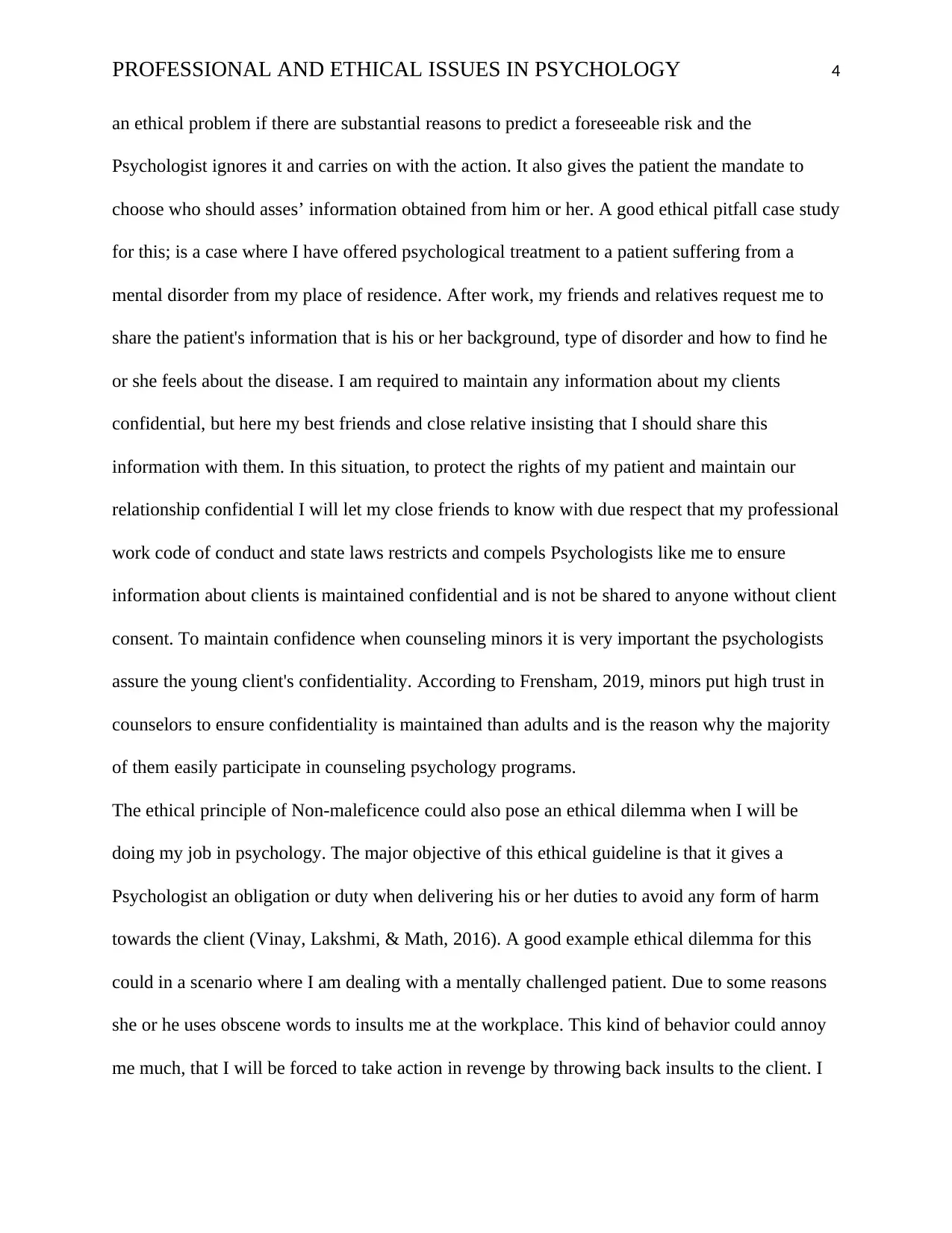
PROFESSIONAL AND ETHICAL ISSUES IN PSYCHOLOGY 4
an ethical problem if there are substantial reasons to predict a foreseeable risk and the
Psychologist ignores it and carries on with the action. It also gives the patient the mandate to
choose who should asses’ information obtained from him or her. A good ethical pitfall case study
for this; is a case where I have offered psychological treatment to a patient suffering from a
mental disorder from my place of residence. After work, my friends and relatives request me to
share the patient's information that is his or her background, type of disorder and how to find he
or she feels about the disease. I am required to maintain any information about my clients
confidential, but here my best friends and close relative insisting that I should share this
information with them. In this situation, to protect the rights of my patient and maintain our
relationship confidential I will let my close friends to know with due respect that my professional
work code of conduct and state laws restricts and compels Psychologists like me to ensure
information about clients is maintained confidential and is not be shared to anyone without client
consent. To maintain confidence when counseling minors it is very important the psychologists
assure the young client's confidentiality. According to Frensham, 2019, minors put high trust in
counselors to ensure confidentiality is maintained than adults and is the reason why the majority
of them easily participate in counseling psychology programs.
The ethical principle of Non-maleficence could also pose an ethical dilemma when I will be
doing my job in psychology. The major objective of this ethical guideline is that it gives a
Psychologist an obligation or duty when delivering his or her duties to avoid any form of harm
towards the client (Vinay, Lakshmi, & Math, 2016). A good example ethical dilemma for this
could in a scenario where I am dealing with a mentally challenged patient. Due to some reasons
she or he uses obscene words to insults me at the workplace. This kind of behavior could annoy
me much, that I will be forced to take action in revenge by throwing back insults to the client. I
an ethical problem if there are substantial reasons to predict a foreseeable risk and the
Psychologist ignores it and carries on with the action. It also gives the patient the mandate to
choose who should asses’ information obtained from him or her. A good ethical pitfall case study
for this; is a case where I have offered psychological treatment to a patient suffering from a
mental disorder from my place of residence. After work, my friends and relatives request me to
share the patient's information that is his or her background, type of disorder and how to find he
or she feels about the disease. I am required to maintain any information about my clients
confidential, but here my best friends and close relative insisting that I should share this
information with them. In this situation, to protect the rights of my patient and maintain our
relationship confidential I will let my close friends to know with due respect that my professional
work code of conduct and state laws restricts and compels Psychologists like me to ensure
information about clients is maintained confidential and is not be shared to anyone without client
consent. To maintain confidence when counseling minors it is very important the psychologists
assure the young client's confidentiality. According to Frensham, 2019, minors put high trust in
counselors to ensure confidentiality is maintained than adults and is the reason why the majority
of them easily participate in counseling psychology programs.
The ethical principle of Non-maleficence could also pose an ethical dilemma when I will be
doing my job in psychology. The major objective of this ethical guideline is that it gives a
Psychologist an obligation or duty when delivering his or her duties to avoid any form of harm
towards the client (Vinay, Lakshmi, & Math, 2016). A good example ethical dilemma for this
could in a scenario where I am dealing with a mentally challenged patient. Due to some reasons
she or he uses obscene words to insults me at the workplace. This kind of behavior could annoy
me much, that I will be forced to take action in revenge by throwing back insults to the client. I
Paraphrase This Document
Need a fresh take? Get an instant paraphrase of this document with our AI Paraphraser
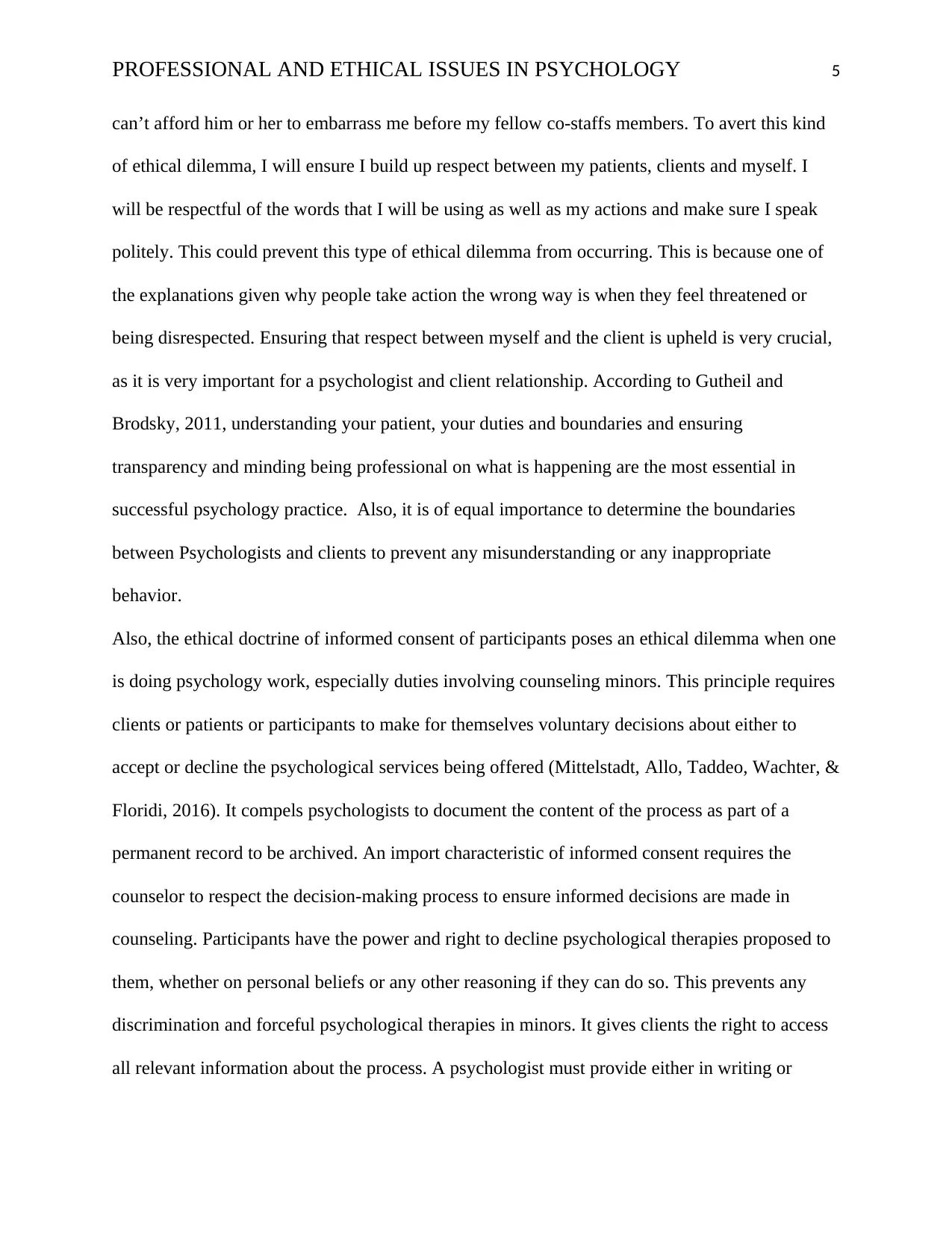
PROFESSIONAL AND ETHICAL ISSUES IN PSYCHOLOGY 5
can’t afford him or her to embarrass me before my fellow co-staffs members. To avert this kind
of ethical dilemma, I will ensure I build up respect between my patients, clients and myself. I
will be respectful of the words that I will be using as well as my actions and make sure I speak
politely. This could prevent this type of ethical dilemma from occurring. This is because one of
the explanations given why people take action the wrong way is when they feel threatened or
being disrespected. Ensuring that respect between myself and the client is upheld is very crucial,
as it is very important for a psychologist and client relationship. According to Gutheil and
Brodsky, 2011, understanding your patient, your duties and boundaries and ensuring
transparency and minding being professional on what is happening are the most essential in
successful psychology practice. Also, it is of equal importance to determine the boundaries
between Psychologists and clients to prevent any misunderstanding or any inappropriate
behavior.
Also, the ethical doctrine of informed consent of participants poses an ethical dilemma when one
is doing psychology work, especially duties involving counseling minors. This principle requires
clients or patients or participants to make for themselves voluntary decisions about either to
accept or decline the psychological services being offered (Mittelstadt, Allo, Taddeo, Wachter, &
Floridi, 2016). It compels psychologists to document the content of the process as part of a
permanent record to be archived. An import characteristic of informed consent requires the
counselor to respect the decision-making process to ensure informed decisions are made in
counseling. Participants have the power and right to decline psychological therapies proposed to
them, whether on personal beliefs or any other reasoning if they can do so. This prevents any
discrimination and forceful psychological therapies in minors. It gives clients the right to access
all relevant information about the process. A psychologist must provide either in writing or
can’t afford him or her to embarrass me before my fellow co-staffs members. To avert this kind
of ethical dilemma, I will ensure I build up respect between my patients, clients and myself. I
will be respectful of the words that I will be using as well as my actions and make sure I speak
politely. This could prevent this type of ethical dilemma from occurring. This is because one of
the explanations given why people take action the wrong way is when they feel threatened or
being disrespected. Ensuring that respect between myself and the client is upheld is very crucial,
as it is very important for a psychologist and client relationship. According to Gutheil and
Brodsky, 2011, understanding your patient, your duties and boundaries and ensuring
transparency and minding being professional on what is happening are the most essential in
successful psychology practice. Also, it is of equal importance to determine the boundaries
between Psychologists and clients to prevent any misunderstanding or any inappropriate
behavior.
Also, the ethical doctrine of informed consent of participants poses an ethical dilemma when one
is doing psychology work, especially duties involving counseling minors. This principle requires
clients or patients or participants to make for themselves voluntary decisions about either to
accept or decline the psychological services being offered (Mittelstadt, Allo, Taddeo, Wachter, &
Floridi, 2016). It compels psychologists to document the content of the process as part of a
permanent record to be archived. An import characteristic of informed consent requires the
counselor to respect the decision-making process to ensure informed decisions are made in
counseling. Participants have the power and right to decline psychological therapies proposed to
them, whether on personal beliefs or any other reasoning if they can do so. This prevents any
discrimination and forceful psychological therapies in minors. It gives clients the right to access
all relevant information about the process. A psychologist must provide either in writing or
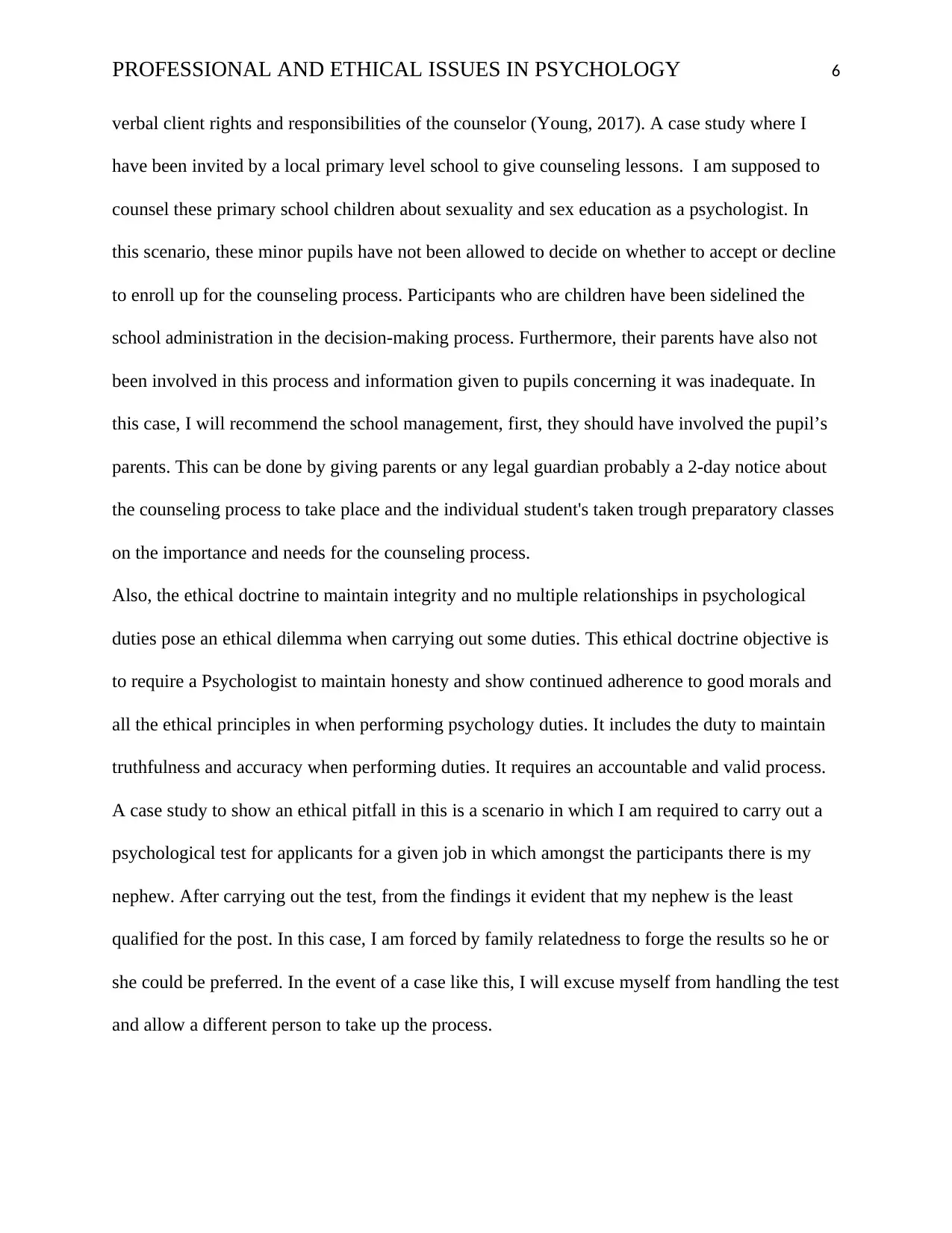
PROFESSIONAL AND ETHICAL ISSUES IN PSYCHOLOGY 6
verbal client rights and responsibilities of the counselor (Young, 2017). A case study where I
have been invited by a local primary level school to give counseling lessons. I am supposed to
counsel these primary school children about sexuality and sex education as a psychologist. In
this scenario, these minor pupils have not been allowed to decide on whether to accept or decline
to enroll up for the counseling process. Participants who are children have been sidelined the
school administration in the decision-making process. Furthermore, their parents have also not
been involved in this process and information given to pupils concerning it was inadequate. In
this case, I will recommend the school management, first, they should have involved the pupil’s
parents. This can be done by giving parents or any legal guardian probably a 2-day notice about
the counseling process to take place and the individual student's taken trough preparatory classes
on the importance and needs for the counseling process.
Also, the ethical doctrine to maintain integrity and no multiple relationships in psychological
duties pose an ethical dilemma when carrying out some duties. This ethical doctrine objective is
to require a Psychologist to maintain honesty and show continued adherence to good morals and
all the ethical principles in when performing psychology duties. It includes the duty to maintain
truthfulness and accuracy when performing duties. It requires an accountable and valid process.
A case study to show an ethical pitfall in this is a scenario in which I am required to carry out a
psychological test for applicants for a given job in which amongst the participants there is my
nephew. After carrying out the test, from the findings it evident that my nephew is the least
qualified for the post. In this case, I am forced by family relatedness to forge the results so he or
she could be preferred. In the event of a case like this, I will excuse myself from handling the test
and allow a different person to take up the process.
verbal client rights and responsibilities of the counselor (Young, 2017). A case study where I
have been invited by a local primary level school to give counseling lessons. I am supposed to
counsel these primary school children about sexuality and sex education as a psychologist. In
this scenario, these minor pupils have not been allowed to decide on whether to accept or decline
to enroll up for the counseling process. Participants who are children have been sidelined the
school administration in the decision-making process. Furthermore, their parents have also not
been involved in this process and information given to pupils concerning it was inadequate. In
this case, I will recommend the school management, first, they should have involved the pupil’s
parents. This can be done by giving parents or any legal guardian probably a 2-day notice about
the counseling process to take place and the individual student's taken trough preparatory classes
on the importance and needs for the counseling process.
Also, the ethical doctrine to maintain integrity and no multiple relationships in psychological
duties pose an ethical dilemma when carrying out some duties. This ethical doctrine objective is
to require a Psychologist to maintain honesty and show continued adherence to good morals and
all the ethical principles in when performing psychology duties. It includes the duty to maintain
truthfulness and accuracy when performing duties. It requires an accountable and valid process.
A case study to show an ethical pitfall in this is a scenario in which I am required to carry out a
psychological test for applicants for a given job in which amongst the participants there is my
nephew. After carrying out the test, from the findings it evident that my nephew is the least
qualified for the post. In this case, I am forced by family relatedness to forge the results so he or
she could be preferred. In the event of a case like this, I will excuse myself from handling the test
and allow a different person to take up the process.
⊘ This is a preview!⊘
Do you want full access?
Subscribe today to unlock all pages.

Trusted by 1+ million students worldwide
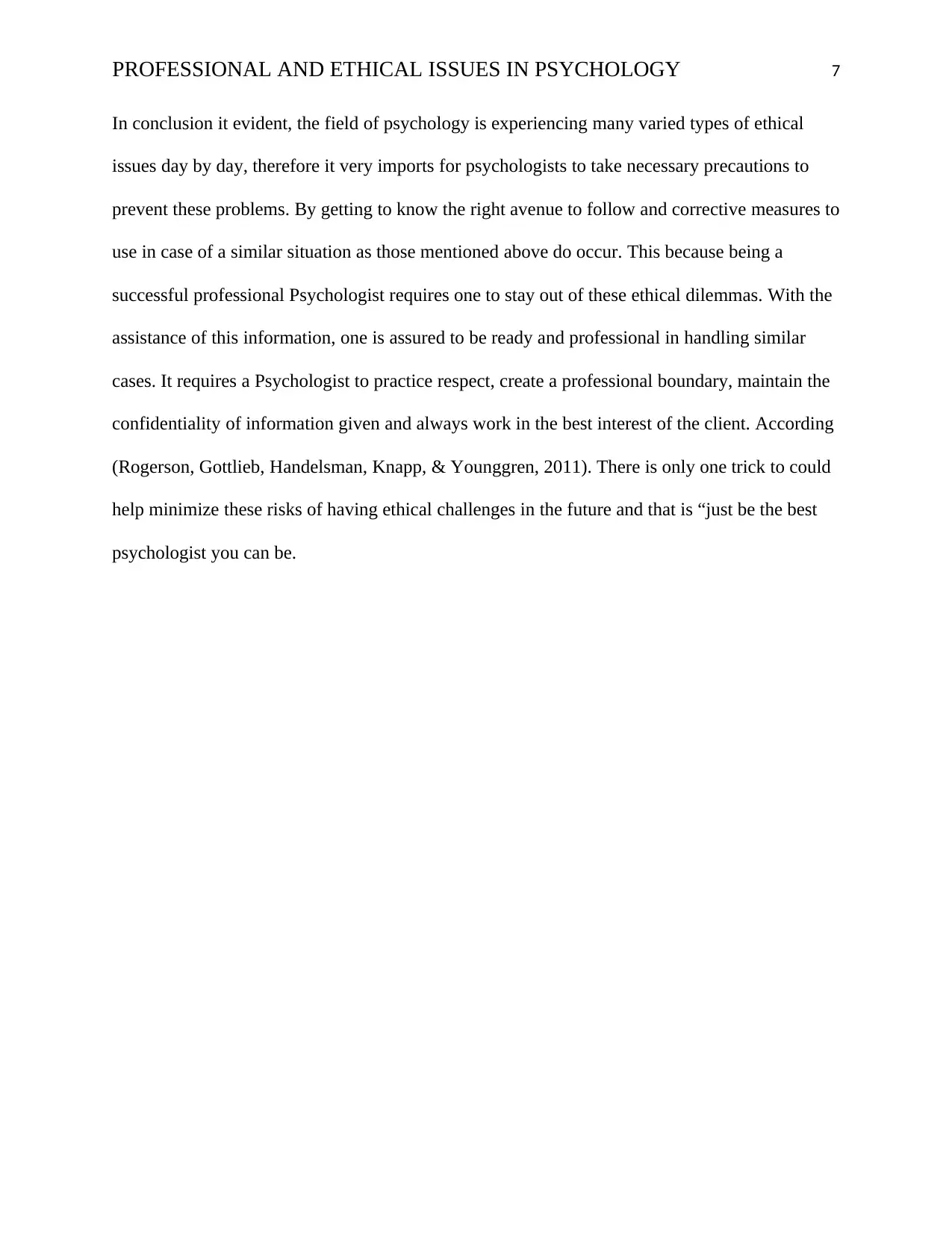
PROFESSIONAL AND ETHICAL ISSUES IN PSYCHOLOGY 7
In conclusion it evident, the field of psychology is experiencing many varied types of ethical
issues day by day, therefore it very imports for psychologists to take necessary precautions to
prevent these problems. By getting to know the right avenue to follow and corrective measures to
use in case of a similar situation as those mentioned above do occur. This because being a
successful professional Psychologist requires one to stay out of these ethical dilemmas. With the
assistance of this information, one is assured to be ready and professional in handling similar
cases. It requires a Psychologist to practice respect, create a professional boundary, maintain the
confidentiality of information given and always work in the best interest of the client. According
(Rogerson, Gottlieb, Handelsman, Knapp, & Younggren, 2011). There is only one trick to could
help minimize these risks of having ethical challenges in the future and that is “just be the best
psychologist you can be.
In conclusion it evident, the field of psychology is experiencing many varied types of ethical
issues day by day, therefore it very imports for psychologists to take necessary precautions to
prevent these problems. By getting to know the right avenue to follow and corrective measures to
use in case of a similar situation as those mentioned above do occur. This because being a
successful professional Psychologist requires one to stay out of these ethical dilemmas. With the
assistance of this information, one is assured to be ready and professional in handling similar
cases. It requires a Psychologist to practice respect, create a professional boundary, maintain the
confidentiality of information given and always work in the best interest of the client. According
(Rogerson, Gottlieb, Handelsman, Knapp, & Younggren, 2011). There is only one trick to could
help minimize these risks of having ethical challenges in the future and that is “just be the best
psychologist you can be.
Paraphrase This Document
Need a fresh take? Get an instant paraphrase of this document with our AI Paraphraser
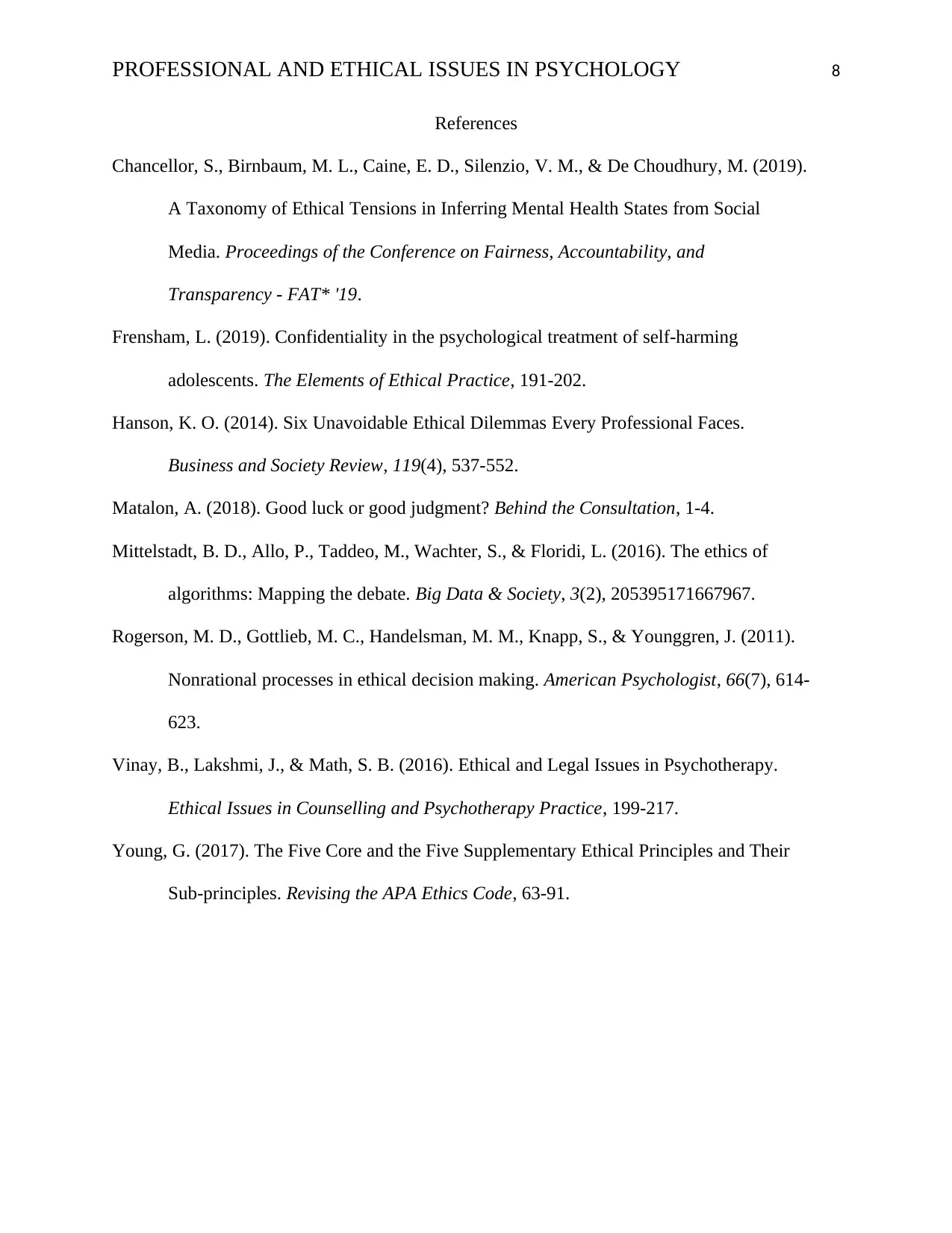
PROFESSIONAL AND ETHICAL ISSUES IN PSYCHOLOGY 8
References
Chancellor, S., Birnbaum, M. L., Caine, E. D., Silenzio, V. M., & De Choudhury, M. (2019).
A Taxonomy of Ethical Tensions in Inferring Mental Health States from Social
Media. Proceedings of the Conference on Fairness, Accountability, and
Transparency - FAT* '19.
Frensham, L. (2019). Confidentiality in the psychological treatment of self-harming
adolescents. The Elements of Ethical Practice, 191-202.
Hanson, K. O. (2014). Six Unavoidable Ethical Dilemmas Every Professional Faces.
Business and Society Review, 119(4), 537-552.
Matalon, A. (2018). Good luck or good judgment? Behind the Consultation, 1-4.
Mittelstadt, B. D., Allo, P., Taddeo, M., Wachter, S., & Floridi, L. (2016). The ethics of
algorithms: Mapping the debate. Big Data & Society, 3(2), 205395171667967.
Rogerson, M. D., Gottlieb, M. C., Handelsman, M. M., Knapp, S., & Younggren, J. (2011).
Nonrational processes in ethical decision making. American Psychologist, 66(7), 614-
623.
Vinay, B., Lakshmi, J., & Math, S. B. (2016). Ethical and Legal Issues in Psychotherapy.
Ethical Issues in Counselling and Psychotherapy Practice, 199-217.
Young, G. (2017). The Five Core and the Five Supplementary Ethical Principles and Their
Sub-principles. Revising the APA Ethics Code, 63-91.
References
Chancellor, S., Birnbaum, M. L., Caine, E. D., Silenzio, V. M., & De Choudhury, M. (2019).
A Taxonomy of Ethical Tensions in Inferring Mental Health States from Social
Media. Proceedings of the Conference on Fairness, Accountability, and
Transparency - FAT* '19.
Frensham, L. (2019). Confidentiality in the psychological treatment of self-harming
adolescents. The Elements of Ethical Practice, 191-202.
Hanson, K. O. (2014). Six Unavoidable Ethical Dilemmas Every Professional Faces.
Business and Society Review, 119(4), 537-552.
Matalon, A. (2018). Good luck or good judgment? Behind the Consultation, 1-4.
Mittelstadt, B. D., Allo, P., Taddeo, M., Wachter, S., & Floridi, L. (2016). The ethics of
algorithms: Mapping the debate. Big Data & Society, 3(2), 205395171667967.
Rogerson, M. D., Gottlieb, M. C., Handelsman, M. M., Knapp, S., & Younggren, J. (2011).
Nonrational processes in ethical decision making. American Psychologist, 66(7), 614-
623.
Vinay, B., Lakshmi, J., & Math, S. B. (2016). Ethical and Legal Issues in Psychotherapy.
Ethical Issues in Counselling and Psychotherapy Practice, 199-217.
Young, G. (2017). The Five Core and the Five Supplementary Ethical Principles and Their
Sub-principles. Revising the APA Ethics Code, 63-91.
1 out of 8
Related Documents
Your All-in-One AI-Powered Toolkit for Academic Success.
+13062052269
info@desklib.com
Available 24*7 on WhatsApp / Email
![[object Object]](/_next/static/media/star-bottom.7253800d.svg)
Unlock your academic potential
Copyright © 2020–2026 A2Z Services. All Rights Reserved. Developed and managed by ZUCOL.





